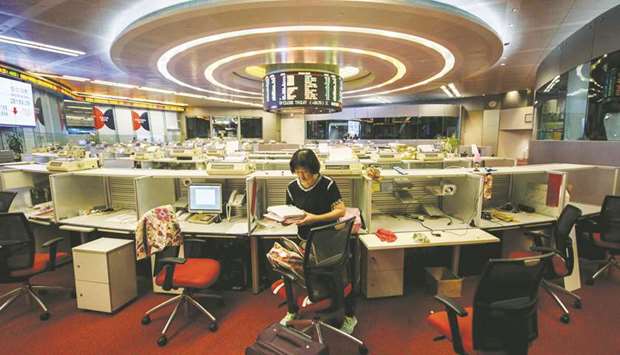Asian markets stuttered yesterday with no fresh news on the China-US trade front and as investors turn their attention to further signs of weakness in the global economy.
A worldwide growth forecast downgrade from the Organisation for Economic Cooperation and Development (OECD) and weaker-than-expected private US jobs data helped send Wall Street lower and dragged on Asian sentiment.
And observers said a surge in the US trade deficit could also spur US President Donald Trump to ratchet up his protectionist agenda, even as he zeroes in on an agreement with China.
“Whether this hardens the president’s attitude (for a deal in) the China trade talks or he chooses a quick win is hard to say,” said Jeffrey Halley, senior market analyst at OANDA.
“But with an election to fight next year, you can almost hear the clanking as the White House swings its heavy artillery in the direction of the other perceived trading bloc culprits.”
Halley suggested the tycoon will turn his focus on Japan – with whom talks are ongoing – and the European Union.
“One thing is for sure, long after the US-China trade deal is put to bed, we will not have heard the last of the word tariff in 2019,” he added.
Shanghai rose 0.1%, extending a bright start to the year that has seen the composite index jump about a quarter.
Tokyo ended 0.7% lower at 21,456.01, while Hong Kong sank 0.9% at 28,779.45. But Sydney put on 0.3%, Singapore added 0.1% and Wellington rose 0.2%. Manila, Mumbai and Bangkok were slightly higher.
Traders are moving cautiously after the OECD’s 2019 forecast cut and disappointing private jobs numbers that bode ill for the release of closely watched government data today.
“We’re seeing a slowdown in the economy, we’re seeing a slowdown in corporate earnings,” Oliver Pursche, chief market strategist at Bruderman Asset Management, told Bloomberg TV.
“The market is waiting to see if things are going to turn out better or worse than they expect, and we just don’t know.”
On currency markets the pound struggled as British and EU officials said talks to hammer out a deal that Prime Minister Theresa May could push through parliament had been “difficult”, with a solution still elusive. With just three weeks before the divorce day, the customs border in Northern Ireland remains a major sticking point and there continue to be worries that Britain will crash out of the EU without an agreement in place, which could batter the economy. However, traders take some comfort in the fact that if MPs reject whatever deal is presented to them in a vote next week, they will vote in the following days on whether to leave with no deal or delay Brexit.

A trader is seen at the Hong Kong Stock Exchange. The index sank 0.9% to 28,779.45 points yesterday.
